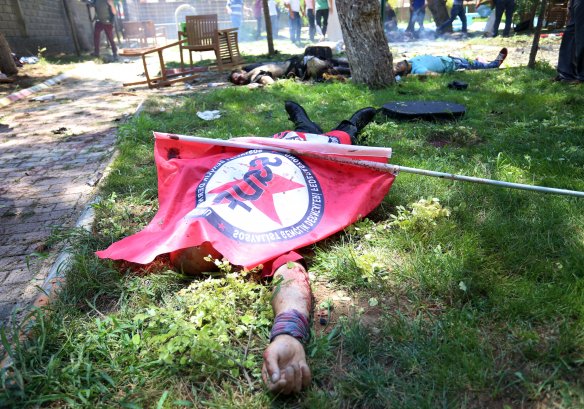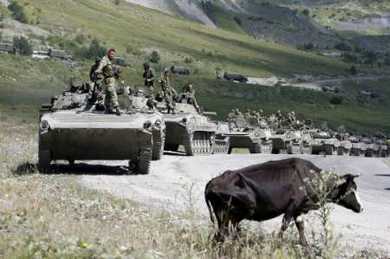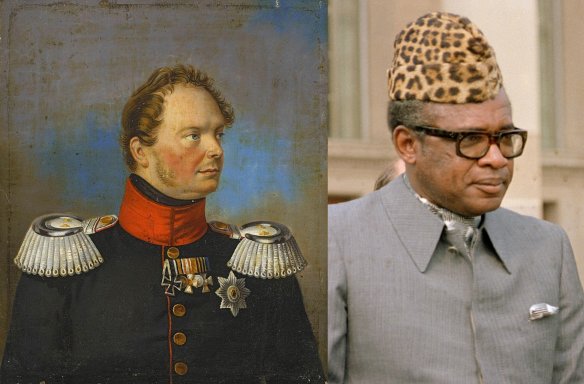Monday 17 August President Salva Kiir did not sign the Proposed IGAD+ peace deal in Addis Ababa, requesting a further 15 days for ‘consultations.’ President Salva Kiir made indirect death threats towards journalists ‘working against the country.’ A large force of military police was deployed around the residence of Clement Wani Konga, the recently dismissed… Read more »
This Week in South Sudan – Week 33
Monday 10 August South Sudanese rival forces traded accusations over who initiated recent clashes in Pariang county, Unity state over the weekend. Ethiopia’s prime minister, Hailemariam Desalegn travelled to Uganda to attend the Inter-Governmental Authority on Development summit on South Sudan. Riek Machar downplayed the rumoured possibility of disintegration within the SPLM/A (IO)’s leadership. Sudan’s… Read more »
The “Sunnification” of Turkey´s Foreign Policy
Two months is a long time in politics – even more so in Turkish politics. At the beginning of June, the Turkish election brought a wave of hope across the country with results that broke the majoritarian (and authoritarian) rule of the reigning Justice and Development Party (AKP). The pro-Kurdish People´s Democratic Party (HDP), winning 13% of the vote, managed to cross the 10% threshold so gaining representation in mainstream politics for Kurds – as well as liberals desperate for a new democratic force in Turkey´s staid political landscape. It was a political victory that promised a continued normalization in Turkish-Kurdish relations and an opportunity to reinvigorate the stalled peace process of 2012. With cautious optimism (and a solid dose of apprehension), Turks anticipated a long hot summer of political wrangling in the search for a coalition government. However, when a young Kurdish ISIS supporter exploded a bomb in the Turkish border town of Suruç on the 20th of July killing 32 young activists and injuring many more, the summer suddenly became hotter than anticipated.

PHOTO: Ozcan Soysal/AP Photo
Oh my, not another ‘Festschrift’!
Eight years ago, I wrote a short piece for a Norwegian science policy journal lampooning the Festschrift as an outmoded form of academic communication. The Festschrift, I can hear some of my non-Scandinavian readers ask: Are such volumes still being published?
Surprisingly, the answer is yes. Of course, it is largely a self-financing enterprise. In signing up for the Tabula gratulatoria, friends of the honoree promise to fork out a few hundred kroner for a book they are often unlikely to read. A book filled with articles that are generally not quite important enough to be published in academic journals (or, even when they are important, are doomed to oblivion because they are in the wrong outlet). Of course, any Festschrift editor would like to think that his or her project is different. In 1980, I edited a Festschrift in honor of Johan Galtung on the occasion of his 50th birthday. The core of the publication was a list of 667 published and unpublished items that the author had written over the years. I would like to think it was a useful project at the time. In the age of electronic publication, such a task might still be worth undertaking, but probably not to publish as a book.

PHOTO: Creative Commons 2.0.
Why then does the tradition survive? Well, it’s a nice gesture to edit a book (or contribute to one) in honor of a friend. The element of surprise adds a measure of excitement to the project. In a country brimming with oil money, we can probably afford to continue this tradition. In my article, I nevertheless offered an alternative explanation for the survival of the Festschrift: If you announce publicly that you think the Festschrift is outdated, you are put in an embarrassing position if you get one yourself. And if you don’t get one, you risk ridicule – did you really think that anyone would take on such a project for you? I took the risk and said ‘no thanks’ in public, and this has been respected by my colleagues (if they ever had such an idea in the first place). I hasten to add that I have contributed to various Festschriften for others, and of course to numerous Tabulae gratulatoriae.
But, of course, I am not immune to flattery. So when my energetic friend and colleague Hans Günter Brauch, who doesn’t ever take ‘no’ for an answer, invited me to submit a volume to his ‘Pioneers’ series published by Springer, I yielded. So now I have a kind of Festschrift edited entirely by myself! PRIO and the Gløbius foundation have joined forces to purchase open access. You can read it here. And if you have room for another hard-copy book in your collection, it comes at a reasonable price, thanks to the open access option. Enjoy! (Or ignore!)
Lethal Autonomous Weapons: Killing the ‘Robots-don’t-Rape’ Argument
Earlier this spring, we debated a law professor who insisted that lethal autonomous weapons (LAWS) could clean up war. The professor posited that a war fought with autonomous weapons would be a war without rape. Taking humans out of the loop would, the argument goes, lead to more humane war. We find this narrative, where technological innovation is equated with human progress based on the assumption that it will end the occurrence of rape in war, highly problematic. We have since reflected on what this ‘progress narrative’ is about and how we as a scholars should approach this type of narrative, particularly as it is gaining traction as part of the wider set of arguments regularly employed by actors promoting the use of lethal autonomous weapons (see report by Christof Heyns, Special Rapporteur on extrajudicial, summary or arbitrary executions).

A graffiti artist’s impression of a military drone. Photo: CC/Thierry Ehrmann.
Thus, in thinking critically about the nature of the progress narrative of which the ‘Robots don’t rape’ argument is part, we make three observations:
PRIO Global Fellow, Luka Biong Deng: ‘Will IGAD Plus deadline have the same fate of IGAD deadlines?’
The IGAD Plus agreed in its first meeting on a document titled “Proposed Compromise Peace Agreement for the Resolution of the Conflict in the Republic of South Sudan” and resolved to share it with the warring parties and other stakeholders as the basis for the next round of peace talks. Besides this document, IGAD Plus… Read more »
Russia’s Reputation Sinks Precipitously in International Opinion Polls

Russian troops moving into Georgia in August 2008.
Seven years ago, Russia launched its week-long war with Georgia. And what seemed then a victory can now be recognized as one of the worst August disasters in Russian history. On the one hand, it is true that the war generated a moment of national unity, which was deeply false but politically very useful. It also produced a conviction that the West was weak and divided, while the reproach in public opinion did not matter. Almost a year and a half ago, Putin sought to reproduce that moment of “patriotic” unity with the annexation of Crimea, but that spectacular triumph soon thereafter delivered him the Donbass quagmire. He also counted on the timidity of Western leaders, but the depth of public indignation in Europe and the US compelled them to take a firm stance and to insist on this firmness over 18 months, despite Moscow’s diplomatic machinations aimed at undermining the West’s unity. Every miscalculation has to be compensated with yet another show of external aggressiveness and domestic repression, but now the Russian elite increasingly worries that the Kremlin’s next supreme whim could prove a blunder too far.
This is the bottom line from the article in Eurasia Daily Monitor, 10 September
This Week in South Sudan – Week 32
Monday 3 August The SPLA claimed it has contained the inter-ethnic fighting in Western Equatoria state, creating a buffer zone between youth from Zande communities and armed Dinka cattle herders. The South Sudanese government presented a new diplomatic push towards strengthening its’ bilateral relationship with the government of neighbouring Sudan. In Yambio town, Western Equatoria, hundreds… Read more »
Institutional Characteristics and Regime Survival: Why Are Semi-Democracies Less Durable than Autocracies and Democracies?
In Zaïre (currently DR Congo) in 1991, the country’s personalist ruler Mobutu Sese Seko faced popular unrest, army mutinies, and shrinking resources for patronage. Mobutu was seemingly starting to lose his grip on power, which he had held since the mid-1960s. In response, Mobutu ended the decades-long ban on political parties other than his own Popular Movement of the Revolution, promised free and fair elections, and entered into a coalition government. Yet, a couple of years later ‒ after the situation had “calmed down”, and after having shored up army support ‒ Mobutu reversed the liberalization measures.

Friedrich Wilhelm IV of Prussia and Mobutu Sese Seko both experimented with semi-democratic regimes.
Almost 150 years earlier, in 1848, several European monarchs from established dynasties also experienced popular pressure for liberalization, following the “February Revolution” in France. The different monarchs and their conservative supporters actually employed quite similar tactics to Mobutu ‒ liberalize when faced with overwhelming opposition and popular unrest, and then retract the concessions when control is regained! As a result, the “semi-democratic” arrangements resulting from Europe’s 1848 springtime uprisings were often reverted by the year’s end, and old authoritarian arrangements reinstated. In Prussia, for example, Friedrich Wilhelm IV faced massive protests and riots in Berlin in March 1848, and caved under pressure to allow the popular election of the first all-Prussian legislative assembly. Within eight months the King regained control with army support, dissolving the national assembly.Read More
Becoming One of Us: The Politics of Citizenship in France, Norway and the UK
Citizenship and naturalization legislation in France, Norway, and the UK has changed substantially more during the 2000s than in previous decades. In which areas of citizenship policy have changes occurred? And how do these changes relate to the trend of reinvigorating the citizenship institution to increase social cohesion?

PHOTO: Creative Commons/lucastheexperience on Flickr.com
This blog post is an exerpt from a Policy Brief from the research project ‘Negotiating the nation: Implications of ethnic and religious diversity for national identity’ (NATION).
- Citizenship legislation in France, Norway, and the UK has changed more in the 2000s than previously.
- Countering terrrorism and striving for social cohesion are two clear areas of citizenship policy development.
- The conflation of citizenship, immigration, and terrorism questions in policy creates dillemmas.
- Permitting dual citizenship is increasingly becoming the norm in Europe.